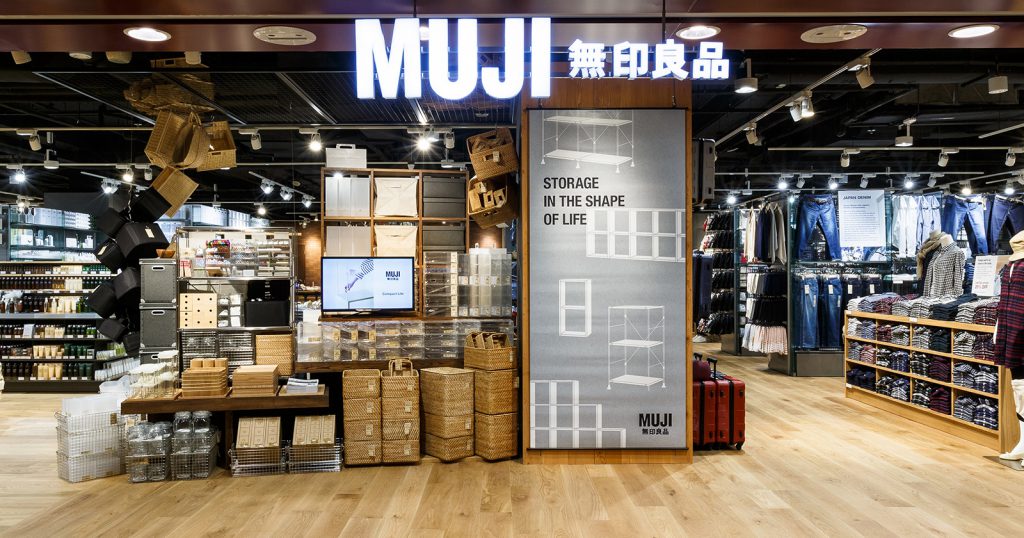MUJI is one Japanese lifestyle brand that many in Singapore are familiar with, despite being flooded by a whole host of other similar brands from Daiso to UNIQLO.
Still, the brand has managed to amassed for itself a cult following among design-conscious consumers, with a core focus that stays true to its name – Mujirushi Ryōhin (無印良品) which means ‘No brand, quality products’.
Founded by the Seiyu Group in 1980, MUJI was a brand aiming to carry ‘tasteful yet affordable’ products as a middle ground between expensive foreign brands and low-quality goods of inferior quality.
With 656 stores around the world and still expanding, MUJI took on an approach that not many retailers were daring enough to embrace.
The MUJI Approach To Branding

If you’ve ever walked into a MUJI store, all you will see are shades of browns and grey past the crimson shopfront, and this too extends to the packaging of their products.
Clear plastic cases and unassuming brown boxes contain the accessories while brown shelves and displays are lined with their equally nondescript products.
Despite looking like a high-end boutique, products by MUJI are still affordable for the masses and they are likely the brand which has influenced an entire generation of retailers to do the same.
This understated branding also extends to their collaborations with several prominent names in arts and design. Japanese architect Shigeru Ban, furniture designers Enzo Mari and Jasper Morrison, and even LEGO are names that MUJI has had the opportunity to work with.
Despite working with all these big names, any mention of them hardly ever goes into the products that come out of these collaborations.
The artists themselves are well aware of this because “they identify with MUJI’s concept and philosophy of selling the product and not the brand”, according to Eric Kobuchi, a sales operations manager for MUJI in the US.
Explaining Their Philosophy
While famous designers accept being unnamed, the company’s in-house designers are downright anonymous. The MUJI philosophy from the products and stores carries over into how the company operates.
Together, these mysterious designers in MUJI’s offices are responsible for their 7,500 product catalogue.
New products are evaluated through a panel which judges its design sensibilities that focuses on “affordable, simple, sleek, minimalist products designed well for a specific task” according to Japanese professor, Yoshinori Fujikawa.

To explain what exactly the MUJI philosophy is, Kei Suzuki, MUJI’s director of the household division and global merchandise inventory control, breaks it into four points.
First is the ‘antithesis to the consumption society’, and it can be explained with MUJI’s commitment to creating products that have a ‘next life’ – products that can have a secondary use, after living out its primary purpose.
Next, they value the individuality of customers despite the uniformity of all their products. There’s always room for individuals to express themselves through the products.
The third point is pretty self-explanatory as we’ve seen so far – ‘No name, anonymous’.
Lastly, the viewpoints of the purchasers and consumers are always taken into account.
The Next Chapter Of MUJI In Singapore

MUJI has a healthy presence in Singapore with 11 outlets here.
Soon though we will be welcoming MUJI’s first flagship store in Southeast Asia and Singapore’s largest. It will soon be opening its doors in Plaza Singapura later this month on 21 July.
Located where John Little used to be, the new MUJI store covers a retail space of 1,896 square meters and will include an all-new concept called Open MUJI – a space for exhibitions, workshops, and new product launches.
Also to be located there is the third MUJI cafe in Singapore, that will be able to accommodate 70 patrons along with two new menu items exclusive to the flagship store.
MUJI’s rapid global expansion in the past two decades has positioned it in direct contention to lifestyle giants such as IKEA (minus the DIY).
In their success, there also breeds pretenders to the throne.
While many retailers have adopted MUJI’s philosophy, none has done it as blatantly as Miniso.
Despite the copycats, MUJI is still holding its own in the hearts of its fans and is on course to spread its brand across the world despite its relatively short history since its founding.










